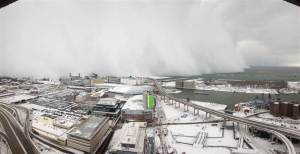It’s that time of year again. Where everyone bundles up, drinks hot chocolate, and talks about moving somewhere warmer. Last years winter was awful, but is this year going to be any better? If today’s storm at my parents house in Buffalo, NY is any indication, then the answer looks to be no.
According to the Farmers Almanac, which is usually 80% right, we are in for another “arctic blast.” “Winter will bring a frosty bite and next summer will be its mirror opposite, so get ready for a one-two punch,” says Janice Stillman.
Accuweather also says that this winter will be cold and snowy, stating that it will become extremely cold in november, but the “brunt of it” will be in January and February.
But what causes these extreme temperatures and snowy conditions? According to CNN a polar vortex “is circulation of strong, upper-level winds that normally surround the northern pole in a counterclockwise direction — a polar low-pressure system.” This then causes extreme cold temperatures in the midwest, east, and south, leaving all of us unhappy and uncomfortable.
But is this weather due to global warming? CNN says that it could be, stating that global warming can cause extreme weather, and a “distortion of the jet stream” which would cause the very cold winters.
The environmental defense fund says that there is a connection but no evidence to say that global warming is the cause. This would make it fall under the category of “correlation is not causation.”
In my opinion it would be very hard to prove that it is caused by global warming but I do understand the strong correlation between the two.
Resources:
http://www.edf.org/blog/2014/07/15/bundle-polar-vortex-returns-it-climate-change
http://www.cnn.com/2014/01/06/showbiz/polar-vortex-explanation/
http://www.accuweather.com/en/weather-news/us-2014-2015-winter-forecast/35422753
http://www.almanac.com/content/winter-weather-predictions-old-farmers-almanac
http://www.nbcnews.com/news/photo/here-comes-snow-wall-weather-blankets-buffalo-n250951


I think this topic is very interesting because it could be argued that global warming is the cause of the bizarre weather. The part that interests me the most about this topic is that, is there evidence that the temperature of one season affect the temperature of the next season? I also think there is a strong correlation between global warming and the recent changes in temperature. But more observational studies must be done in order for a correlation to be found either direct or indirect.
We’ve already been experiencing could weather so far this year and I didn’t think it would be stopping anytime soon. The polar vortex we experienced last year was brutal even in southern states. All that being said though I really like your blog because it comes at the perfect time. The cold weather is just really starting to hit and we’re all looking for ways to stay warm. But putting aside the thoughts of fireplaces and a cruise in the Bahamas, most of us are thinking about why this is happening. It’s not always a serious thought but it’s always there when we, as college students, wake up in the morning. “Why is it so cold outside”? Although you determined that correlation does not equal causation I too see the relationship between global warming and the frigid temperatures we are going to experience. Hopefully we will all make it through, without frost bite, and then we have a hot summer to look forward to.
This is a vert intriguing article for this time of year. In an article on a NASA website on climate changes, they talk about how extreme climate changes have been correlated with global warming. In addition to climate changes they also speculate that the melting of the glaciers and warming of the ocean temperature could also have a correlation to global warming. But just as the blog states, scientists cannot be 100% certain that this is evidence for global warming so correlation does not equal causation. Chance may still be present in their observations because there is no way to rule it out here. There are too many third variables present that could lead to global warming (ex: ocean temperatures increasing, climate changes, glaciers melting, ocean acidification, etc.) so it is impossible for scientists to pinpoint which are actual causes and which ones are not.
http://climate.nasa.gov/evidence/
I like your article this is a very controversial topic, as a lot of people do and don’t believe in global warming. One study of global warming research reported by The Guardian, has done a study on the melting of the polar ice caps effect on winters in European and what to expect in the future. They found that the melting of the ice caps is actually creating stronger and colder wind temperatures, which is why winters seem to be getting colder and colder each year. However, once the ice caps are all melted, which they predict to be in the 2030’s, the winters will no longer be as harsh. Like you said, correlation does not equal causation, so this observational study has the potential to be true, but of course can never fully be proven.
http://www.theguardian.com/environment/2014/oct/26/global-warming-has-doubled-risk-harsh-winters-eurasia-research-finds